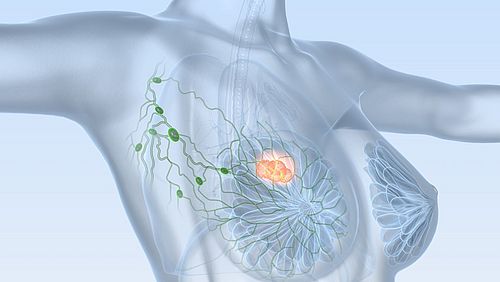19 July 2023
Tailored surgical procedure yields comparable findings
Results of a subproject of the large-scale breast cancer study "TAXIS" show that radical removal of axillary lymph nodes is not decisive for the choice of systemic therapy. The goal of this surgical procedure is, among other things, to assess the spread of the tumor, however, it is known to be associated with significant side effects.
Complete surgical removal of axillary lymph nodes for breast cancer, also referd to as axillary lymph node dissection, is a severe procedure whose necessity has been questioned for some clinical settings in the past. It has been removed from the agenda of standard treatments, for example, for patients with node-negative breast cancer or those with hormone receptor-negative or HER2-positive tumors.
Is less more?
The Oncoplastic Breast Consortium, led by Prof. Walter P. Weber, continues to pursue the question of the benefits of axillary lymph node dissection with its international TAXIS study. Within TAXIS, all breast cancer patients are treated according to a tailored procedure where only suspicious lymph nodes, diagnosed by palpation and image-guidance, are removed in the first place. Still during surgery, the study participants are randomised into two groups. One group receives axillary lymphe node dissection directly, while the other group receives radiation therapy extended to the axillary region instead.
No information gain
A planned sub-project based on data from the first 500 patients treated has now been published in "JAMA Surgery", the highest rated journal in surgery (impact factor 16.7). The aim was to investigate whether information gained from additional axillary lymph node dissection has an impact on the choice and extent of subsequent systemic therapy such as chemotherapy, anti-hormone therapy or targeted anti-tumor medication. The analyses clearly show that this is not the case. The number of patients receiving chemotherapy was comparable in both groups, as was the type and extent of systemic therapy proposed, whether chemotherapy, radiotherapy, or endocrine therapy. While an average of fifteen lypmh nodes were removed with axillary dissection, two of which were found tumor-positive, the selective procedure removed an average of only four, two of which were found to be tmor-positive.
Study on track
Thus, these results clearly call into question the benefits of axillary dissection as a decision-making tool for choosing systemic therapy in breast cancer patients after tailored axillary surgery, reinforcing the importance of the TAXIS study and its research question. The impact of the surgical procedure on the oncological safety, survival and quality of life of the patients will be shown in the final evaluations, which will be awaited with great interest from the research community and patients in the same way.

Impact of tailored versus complete axillary lymph node removal on systemic therapy for breast cancer.
A subproject of the TAXIS study
Principle Investigator
Prof. Walter P. Weber, Chief of Breast Surgery, Head of the Department of Breast, Abdomen and Pelvis, University Hospital of Basel, Switzerland
Study design
Prospective observational cohort study as planned subproject of the randomised phase III TAXIS study
Study centers
A total of 43 centers in Switzerland, Germany, Austria, Hungary, Lithuania, Greece, Croatia and Argentina
Patients
500 with breast cancer and clinically confirmed lymph node involvement
Project duration
08/2018-06/2022
DKF Scientific Services
Regulatory Affairs, Project Management, Data Management, Monitoring, IT services
Original publication
Association of Axillary Dissection With Systemic Therapy in Patients With Clinically Node-Positive Breast Cancer, JAMA Surg. Published online July 19, 2023. doi:10.1001/jamasurg.2023.2840
Further information
TAXIS study on clinicaltrials.gov
Oncoplastic Breast Consortium (OPBC)

"The results of the current study are of great importance because they show us that a less radical surgery does not affect the choice of subsequent systemic therapy."
Prof. Walter P. Weber, Principal Investigator and Head of Breast Surgery at the University Hospital Basel
